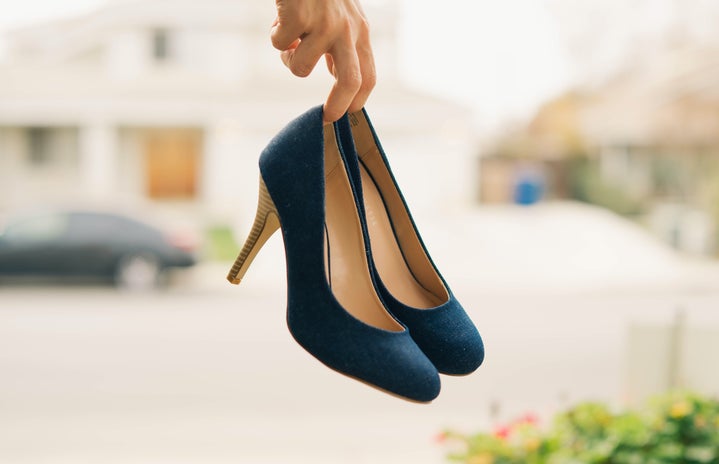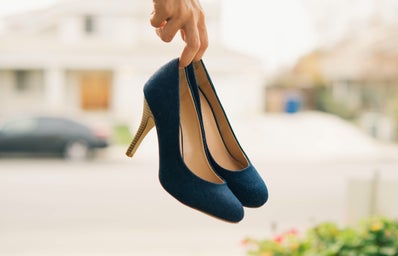Every day I see a barrage of images, ads, and articles telling me what fashion hacks and must-buys I need to dress like this latest celebrity or the latest trending aesthetic of the season. As I write this, I can tell you that I’ve seen two such articles in fifteen minutes- all you have to do is open social media.
Perhaps that is why I didn’t wear jeans or leggings to school for nearly five years, because my younger self thought that it was too conformist. Everyone goes through an experimental middle school fashion phase. Dressing like other people was my greatest pet peeve.
But I digress…what does this dialogue around fashion mean for both women and every other person alike? Modern day views on fashion become problematic as they make the assumption that it is not enough to dress for yourself, in other words, your body becomes an ornament, not an instrument.
In her Ted Talk, Lindsey Kite, P.h.D, founder of Beauty Redefined, returns to the non-profit’s mantra “my body is an instrument, not an ornament.” Arbitrary, and frankly nonsensical, fashion rules about and what is considered “appropriate” have been instilled in us since we were children. These rules vary from what body types can wear, the mixing of patterns, and the stigmatization of different clothing items (for example, a short skirt versus a long skirt and so on). When your body is an ornament, your value as a human is reduced. It is not about all the amazing things your body can do for you, but rather, the repercussions of not conforming to shallow social expectations. When your body is an instrument, it becomes a tool for self-development regardless of appearance.
In reducing women’s and femme’s bodies to packaging judged as a reflection of our character, society perpetuates a system of oppression that preoccupies us with our appearance, therefore, consumes our mental and emotional energy. Author Renee Engeln dubs this as self-monitoring, the constant conscious and subconscious policing of our bodies stemming from fear and self-doubt. From childhood, we are flooded by messages teaching us to suppress this form of self-expression at the risk of putting ourselves in dangerous situations and receiving negative attention.
Learning how to reject this dialogue is long and complicated, but there are a few things I like to remind myself when I fall down the rabbit hole:
1. Dress for comfort, and dress in your comfort zone.
It is one thing to dress in comfortable clothing, and another to dress in what makes you feel comfortable. This is different for everyone. I feel most like myself when I wear clothes with meaning, something that reflects my mood, mixes patterns and colors, or borders on the absurd. When I am overwhelmed, fashion is a way for me to anchor myself, and I don’t have time to reject my truths and trick myself into being palatable.
Oftentimes, my clothes have an emotional meaning to them, and when I don’t take the time to care for myself and be honest in my self-expression, I feel lost. Dressing outside of that comfort zone often leads to a new process of self-discovery: like a reset button. At the same time, clothes fulfill an emotional need, and when you need to dress to be comfortable, that is okay. You are not letting yourself go. You are not being untrue.
2. Be kind to yourself.
When I set myself on a journey of reclaiming my body through fashion, I expected that since I read the books, exposed myself to the subjects, and developed my own philosophy, every day I could only go up. This is far from the truth. When you struggle with body image, it is often a manifestation of other emotions. For me, it often comes from a feeling of powerlessness. Go ahead and feel these emotions, acknowledge them, and get help if that is what you need.
Above everything else, my experiences have taught me that my feelings about my body are valid, and not superficial. We have been digesting messages about our bodies since we were born, and just because you don’t believe in these messages but fall victim to the regardless doesn’t mean your morals are compromised. For young girls, studies have shown that we become aware of our bodies and diet culture as young as the third grade, and this age is growing younger. I don’t have to be a picture of happiness and body confidence everyday, and it drains mental energy to wear makeup and clothes that you aren’t in the mood to wear. So you don’t have to. Not every day will be perfect.
3. Ditch the Rules
You know what I’m talking about. By rejecting the notions of what you can and can’t do with your body, you are taking a step toward freedom. In Beauty Myth, Naomi Wolf writes, “A culture fixated on female thinness is not an obsession about female beauty, but an obsession about female obedience.” This applies to anyone. I just remind myself that it isn’t about me, it’s about the danger of being empowered. Once again, Naomi Wolf writes “Women who love themselves are threatening.” So be a threat.
One helpful thing you can do is cater your social media away from diet culture and toxic fitspiration to create a diverse feed reflecting real people and real emotions, from disability, gender, sexuality, religion, body size, race, etc . Start by unfollowing diet accounts and find accounts about body liberation and acceptance. I’d recommend @iweigh, @bodiposipanda, and @yrfatfriend to begin.
Let go of the idea that your body exists for the consumption of others, it is yours.
4. Wear what makes you happy
This is simple. Often, we put clothes back on the rack or back in the closet because we think something along the lines of, I love this but the ________ just isn’t for me. I couldn’t pull it off. Substitute anything, color, pattern, fit, and you have already lost emotional energy to something you aren’t wearing. The truth is, it isn’t your body that wears the clothes, but your attitude. If it evokes any kind of positive emotion, it is worth it.
Fashionista, activist, and creator Ben Pechey (they/them) recently touched me with their writing, saying, “To conclude fashion month, I urge you to make sure that you are always 100% honest with how you feel. Always make sure you say if you love something, and say if you don’t. Be yourself, and if an environment makes you feel any different, then LEAVE.”
5. Ask yourself, “So what?”
To tell you the truth, getting dressed every morning scares me. I’m scared by the way different outfits make me feel, and by what I’m afraid people will think of me. But then I ask myself, so what? I wouldn’t want to be friends with someone who can’t accept the way I look, and it isn’t worth subjecting myself to the worry and self-doubt. Last-minute outfit changes because of these insecurities are the bane of my existence, and fashion-regrets never work in my favor. Get to the root of your insecurities, and see if you have the mental energy to continue from there.
In the end, it is nobody’s and no body’s business what you wear. It takes time. So dress for yourself.



